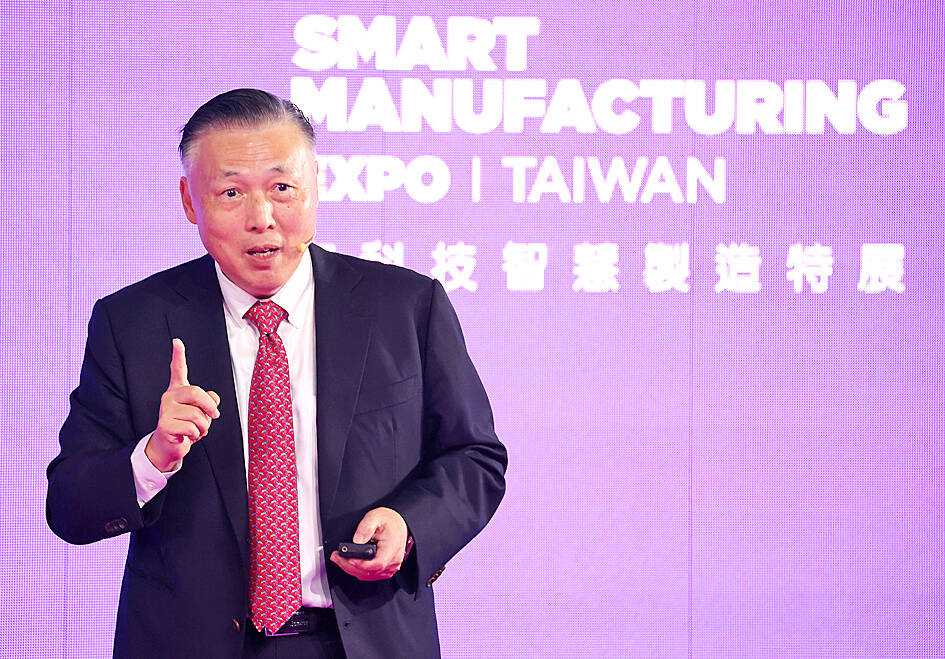ASE Technology Holding Co (ASE, 日月光投控), the world’s biggest chip packaging and testing service provider, yesterday said that revenue would return to growth this year, bolstered by restocking demand.
The company expects annual revenue growth to rise by as much as 10 percent, in line with the global semiconductor industry’s recovery.
ASE said it is on track to double its leading-edge packaging revenue to about US$250 million this year.

Photo: CNA
The growth momentum would last through the next few years, it added.
ASE has also been working with a leading foundry supplier on advanced “chip-on-wafer-on-substrate (CoWoS)” packaging technology, it said.
“2024 will be a year of recovery. We will be coming out of inventory adjustment in the first half. We expect growth to accelerate in the second half,” ASE chief operating officer Tien Wu (吳田玉) told investors during a videoconference.
This year, the company’s assembly and test manufacturing (ATM) revenue would grow “at a similar rate with the [global] logic semiconductor market,” Wu said.
SEMI and analysts expect the global semiconductor market to grow between 6 and 10 percent annually, he said.
Robust smartphone sales in China over the past few months indicate that the semiconductor industry is either at the beginning of an upcycle, or the tail end of a prolonged inventory adjustment, Wu said. A majority of ASE’s customers are to return to their “recovery path” from the third quarter, after driving down inventory to healthy levels, he said.
ASE plans to expand equipment capital expenditure by 40 to 50 percent this year from a year earlier, with a major portion of the funds allocated for leading-edge packaging capacity expansion, chief financial officer Joseph Tung (董宏思) said.
Gross margin this year is expected to rebound to the company’s target of between 25 percent and 30 percent, Tung said.
ASE expects ATM revenue this quarter to be flat at NT$73.32 billion (US$2.34 billion) compared with a year earlier, but that would still be better than the typically slow first quarter in the past, when ATM revenue usually dipped between 10 and 15 percent, it said.
Gross margin for the ATM business this quarter would also be similar to a year earlier at about 20.1 percent, it said.
Revenue from its electronics manufacturing services this quarter would be flat at NT$57.73 billion, it added.
ASE’s net profit last quarter grew 7 percent to NT$9.39 billion from NT$8.78 billion the previous quarter.
However, on an annual basis, it slumped 40 percent from NT$15.73 billion.
For the whole of last year, net profit almost halved to NT$31.73 billion from NT$62.09 billion.
Earnings per share dropped to NT$7.39 from NT$14.53, while gross margin slid from 20.1 percent to 15.8 percent.

CAUTIOUS RECOVERY: While the manufacturing sector returned to growth amid the US-China trade truce, firms remain wary as uncertainty clouds the outlook, the CIER said The local manufacturing sector returned to expansion last month, as the official purchasing managers’ index (PMI) rose 2.1 points to 51.0, driven by a temporary easing in US-China trade tensions, the Chung-Hua Institution for Economic Research (CIER, 中華經濟研究院) said yesterday. The PMI gauges the health of the manufacturing industry, with readings above 50 indicating expansion and those below 50 signaling contraction. “Firms are not as pessimistic as they were in April, but they remain far from optimistic,” CIER president Lien Hsien-ming (連賢明) said at a news conference. The full impact of US tariff decisions is unlikely to become clear until later this month

With an approval rating of just two percent, Peruvian President Dina Boluarte might be the world’s most unpopular leader, according to pollsters. Protests greeted her rise to power 29 months ago, and have marked her entire term — joined by assorted scandals, investigations, controversies and a surge in gang violence. The 63-year-old is the target of a dozen probes, including for her alleged failure to declare gifts of luxury jewels and watches, a scandal inevitably dubbed “Rolexgate.” She is also under the microscope for a two-week undeclared absence for nose surgery — which she insists was medical, not cosmetic — and is

GROWING CONCERN: Some senior Trump administration officials opposed the UAE expansion over fears that another TSMC project could jeopardize its US investment Taiwan Semiconductor Manufacturing Co (TSMC, 台積電) is evaluating building an advanced production facility in the United Arab Emirates (UAE) and has discussed the possibility with officials in US President Donald Trump’s administration, people familiar with the matter said, in a potentially major bet on the Middle East that would only come to fruition with Washington’s approval. The company has had multiple meetings in the past few months with US Special Envoy to the Middle East Steve Witkoff and officials from MGX, an influential investment vehicle overseen by the UAE president’s brother, the people said. The conversations are a continuation of talks that

CHIP DUTIES: TSMC said it voiced its concerns to Washington about tariffs, telling the US commerce department that it wants ‘fair treatment’ to protect its competitiveness Taiwan Semiconductor Manufacturing Co (TSMC, 台積電) yesterday reiterated robust business prospects for this year as strong artificial intelligence (AI) chip demand from Nvidia Corp and other customers would absorb the impacts of US tariffs. “The impact of tariffs would be indirect, as the custom tax is the importers’ responsibility, not the exporters,” TSMC chairman and chief executive officer C.C. Wei (魏哲家) said at the chipmaker’s annual shareholders’ meeting in Hsinchu City. TSMC’s business could be affected if people become reluctant to buy electronics due to inflated prices, Wei said. In addition, the chipmaker has voiced its concern to the US Department of Commerce